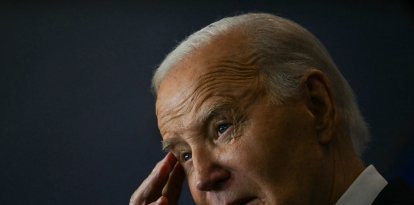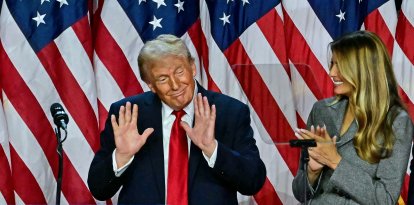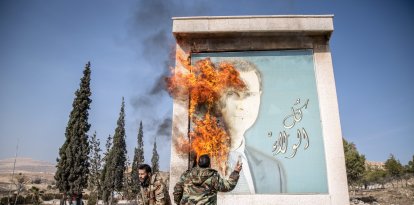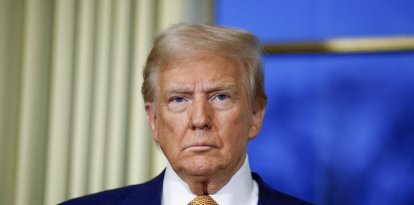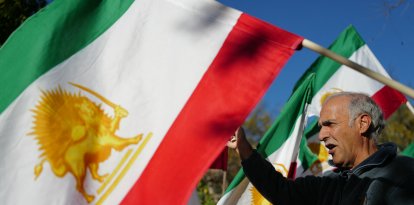Venezuela: When reality hits
The latest wave of repression under the Chavista regime in Venezuela reminds us of the nature of the system and forces us to rethink strategies.
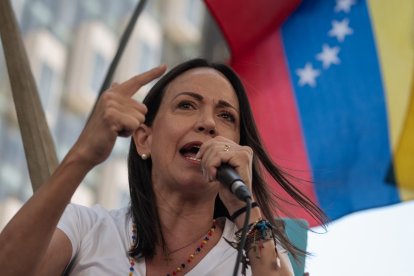
Venezuelan opposition leader, Maria Corina Machado, speaks to supporters during a demonstration on the anniversary of the 1958 uprising that overthrew a military dictatorship, at the Altamira square in Caracas on January 23, 2024. - Venezuelan opposition leader Maria Corina Machado, who aspires to participate in this year's presidential elections despite being politically disqualified, denounced this Tuesday that her party headquarters appeared with graffiti alluding to a recent ""anti-terrorist"" slogan by President Nicolas Maduro. (Photo by Gabriela Oraa / AFP)
The very successful Venezuelan opposition primaries on Oct. 22 left us in a state of intoxication in many ways. More than 2 million Venezuelans came out to vote for a new opposition leader, exceeding all expectations. It was a sort of acclamation. The overwhelming victory by María Corina Machado, with more than 92% of the vote, made it clear that a new, legitimate and popular political phenomenon had emerged in the country.
The scene seemed hectic. Like deus ex machina, a new actor burst into politics, capable of tightening the rope and imposing a new agenda. The train wreck was inevitable and the state of conflict desirable, eventual. But the spirit was frustrated by the unbearable reality.
Less than two months after the primary, the regime imposed an arrest warrant on three key members of María Corina Machado's team. Under that pressure, which turned into blackmail, Maduro was able to get back on a track of what seemed like an untamed phenomenon. The United States, unfortunately, lent itself to the game of extortion and, in exchange for relaxing the recent wave of repression, returned Maduro one of his most precious jewels: Chavista figurehead Alex Saab, imprisoned until Dec. 20, 2023 in a gringo prison.
The Machiavellian game of scam and exchange reminded us of the harsh reality: everyone who lives in Venezuela, and even some outside of Venezuela, are hostages to the Maduro regime. Whoever Maduro wants to be free is free, only until Maduro wants him to be free. So, no one is free. And since no one is free, what hope is there?
I say: yes, there is hope. But, when reality hits, it's time to rethink. And one of the approaches that must be taken is to design a strategy based on admitting the true state of our lives: we are hostages, and Venezuela cannot be seen as anything besides the kidnapper.
Playing by the rules of the system, as is being proposed today when the electoral route is insisted upon unconditionally, implies an enormous risk. The system, which is not precocious, has been perfected for more than 25 years to achieve the systematic suppression of every gesture of dissent. It is the optimal Chavista machine of annihilation. And the annihilation is not necessarily physical. Chavismo also annihilates you when it corrupts you, when it commits you to the mafia's radioactive business. That has been the prime tactic in recent years.
Now, who could suggest that the fight for Venezuela's freedom could be done without any risk? You would have to be very naïve. There are no infallible scenarios on the horizon. There are realities, rather, that must be assumed. And the true reality, which today weighs like an anvil, is that the alternatives are limited to having to play within the system.
Nor is international military assistance an option, as was once on the table, when Trump lived in the White House, nor is there a spirit of subversion in Venezuela or the ability to wrest the monopoly of violence from Chavismo. The only thing there, as exhibited on Oct. 22 during the primaries, is an energetic and determined will to express oneself without this implying greater physical risk. It is the "silent majority," as would say Richard Nixon, which political scientist Enderson Sequera also recently suggested to me.
This does not mean that this premature spirit of change, very reserved and cautious, cannot turn into a mutiny, which is what would really shake up the great dungeon that is Venezuela. In fact, if the case of Venezuela is considered as a kidnapping scenario, given that there is no external force willing to resolve the crossroads, only mutiny remains.
But rebellions are not as spontaneous as we have been led to believe. Every revolt had one or more triggers. Years of excess and precariousness led to the storming of the Bastille. Our own history confirms this for us. The arbitrary closure of a television channel produced the wave of protests in 2007; the theft of the Capriles elections led to mass demonstrations in 2013; the murder of a couple of students led to those of 2014; and in 2017, the suppression of the opposition in the National Assembly produced the bloodiest stage of demonstrations in our recent history. While in each episode the opposition has not achieved the objective of liberating Venezuela, it has a lot to do with the low level of our leadership.
María Corina Machado is trying to navigate stormy waters. She must play with the little she has at her disposal, which is not at all encouraging, but at the same time must set the tone for a mutiny. The issue is difficult to reconcile. How do you build the spirit and keep hope intact from a strategy that seems unviable?
This happens, I think, by recognizing the reality, which was imposed when Maduro ordered the capture of three members of Machado's team and when yesterday, Jan. 23, three of her campaign coordinators disappeared, apparently kidnapped by a group of hooded men.
Recognizing reality does not imply introspective work, unless in this case. It would be insulting to suggest that Machado or her team are unaware of the nature of the regime. Machado has made a career of correctly diagnosing her opponent.
In this case, recognizing reality involves rhetoric and tactics. The problem with insisting on the electoral route as the only strategy—precisely because alternatives do not exist—is that this inevitably runs into reality. The design of a campaign or the production of jingles confronts the disappearance of people. Machado put it perfectly in a press conference: "How can we campaign in a country where my team is being kidnapped?"
Machado, boxed in by the electoral struggle, must seek to convert the route into a movement of defiance and disobedience. Each display of docility, no matter how justified or inevitable, will provoke the feeling of defeat that impedes the spirit of mutiny. We know that there is a lot behind the facts, that there are ongoing negotiations and that each action, no matter how incomprehensible, has context. But that doesn't affect perception. And perception is, in the end, the narrative, which is what people take with them when they go to bed.
To a large extent, María Corina Machado is today a political phenomenon because the perception about her is that she dissents from the forms and vices of the traditional politics of the Venezuelan opposition, which have been completely corroded. So, any gesture that makes her look similar to what most of us reject will be lethal for her image—that is, for the continuation of her phenomenon and building up a spirit of uprising.
There really lies, in her particular case, the risk of playing within the system. Therefore, her team's priority must be to keep intact the perception, which does not mean the reality, of her pristine, incorruptible and, much more importantly, different nature.
This appreciation from Venezuelans is what will allow her to persuade millions, even under the worst conditions, in muddy terrain and based on tactics that seem unviable, that she is worth trusting, that she is worth betting on and risking their lives for.
On June 4, 1940, before the House of Commons of the British Parliament, the then Prime Minister Winston Churchill gave his famous speech, "We shall fight on the beaches." In it, Churchill spoke of the imminent Nazi invasion of the United Kingdom, posed the darkest possible scenario and said that there was no choice but to fight to the death. Churchill's extremely realistic speech offered the British people a stark example of their leader's honesty: yes, the horizon is bleak; yes, defeat seems imminent; but no, there is no alternative but to fight.
Behind the spotlight, Churchill spent his time seeking assistance, because he knew he couldn't do it alone. As he had told the British people, the invasion was imminent. However, his responsibility was to make the unthinkable possible. And by perception, based on a raw display of dignity and frankness, people supported him.
Machado has an enormous, transcendental challenge, and so far she has demonstrated her stature, unlike the rest of the leaders that have failed in the past. But part of the strategy must be the neat construction of a brutally honest message, which overcomes the cries for self-help, and inspires society. If perception remains good, millions will heed the call. The mutiny would be right around the corner.
Reality prevails. And there is certainly no room for conventional assessments of politics. What we have before us is the battle of our lives. We are all needed, but we must work based on the facts.















